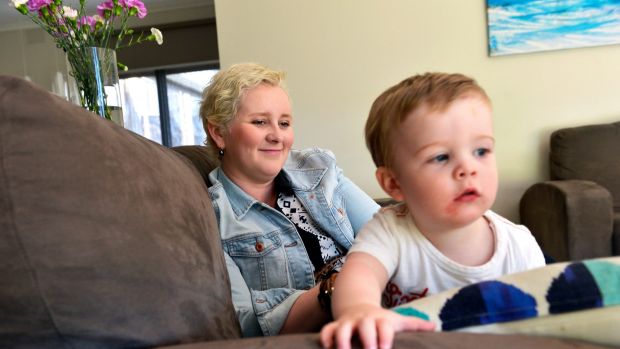High-risk cancer patients at a Melbourne hospital are being charged $1000 for genetic testing and may face delays receiving results that could be crucial to their treatment, oncologists say.
Cabrini Hospital director of oncology Gary Richardson said the hospital’s family cancer clinic saw about 30 patients each month who required genetic testing after being diagnosed with cancers deemed high risk, including young patients with particular cancers or a strong family history.
 Caroline Weston, with son Ted, risked recurrent cancer. Photo: Joe Armao
Caroline Weston, with son Ted, risked recurrent cancer. Photo: Joe Armao
He said the hospital’s clinic previously sent blood to the Peter MacCallum Cancer Institute for specialised genetic testing, and the Victorian Health Department reimbursed its laboratory for the cost.
But Peter Mac told Cabrini its patients would have to pay for testing in late July, after being advised the Health Department would no longer reimburse the laboratory. The department advised that costs would instead need to be covered through Peter Mac’s own family cancer clinic, which would be “responsible for managing its own testing budget”.
Associate Professor Richardson said the change effectively capped the number of cancer patients who could have publicly funded genetic testing in Victoria, meaning Cabrini patients would either have to join queues at over-burdened public clinics or face substantial out-of-pocket costs for genetic testing.
He said the change had created “enormous angst” for Cabrini patients, many of whom were young women facing choices about whether to have mastectomies or surgery to remove their ovaries to reduce their ongoing cancer risk.
Associate Professor Richardson said some patients would forgo genetic testing due to the cost. He was also worried that patients who were willing to pay but needed test results urgently to inform treatment decisions would face delays due to the changes.
There were average waiting times of about six months for an initial appointment at publicly funded family cancer clinics at the Peter MacCallum Cancer Institute, Monash Medical Centre and Austin and Royal Melbourne hospitals, he said.
Associate Professor Richardson said genetics were of growing importance in the cancer field and testing could only be performed at laboratories attached to the four hospitals in Victoria unless patients were prepared to pay $2000 for testing through a single private provider.
Caroline Weston, 30, had genetic testing after being diagnosed with breast cancer in October last year. The testing was arranged through Cabrini Hospital’s family cancer clinic and found that Mrs Weston had a BRCA2 gene mutation, which increased her risk of recurrent cancer.
The finding helped Mrs Weston decide to go ahead with radiation treatment, after initial chemotherapy and a lumpectomy. It led her to have a double mastectomy to reduce her cancer risk in future, and her mother and two sisters were also tested.
“At my age it’s uncommon to get breast cancer and you can’t help but wonder why. It was really important to get that information,” she said.
Mrs Weston said she was fortunate to have avoided a $1000 bill, which would be a big burden for many cancer patients already facing large out-of-pocket costs in the private system.
In response to inquiries from The Age, a spokesman for Health Minister David Davis said the minister had “asked the department to meet with Cabrini to resolve the issue”.
